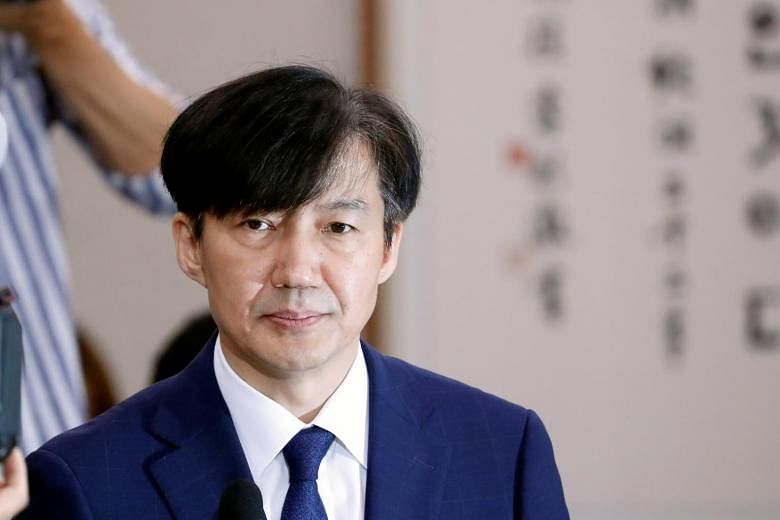SEOUL - A minister who triggered mass protests and divided public opinion in South Korea resigned on Monday (Oct 14).
Mr Cho Kuk's appointment as justice minister early last month triggered a public outcry amid allegations of corruption and power abuse within his family.
Many were surprised by the news of his resignation, which came just hours after he reiterated that he wanted to carry out reforms in the prosecutor's office that is independent but overseen by the justice ministry.
In a statement, Mr Cho, 54, said his role to "kindle" the reforms had "come to an end".
"I judged that I should not add more burden to the President and the government because of my family affairs," he said, referring to a widening probe by the prosecution into his wife and two children.
His wife is accused of forging a university award to help their daughter enrol for a post-graduate medical course and using the family wealth for shady investments.
Mr Cho also said the investigations into his family have been "very hard and very painful", and that he wanted to "put everything down to be with my family".
The continuing scandal has divided public opinion and dragged President Moon Jae-In's approval rating down to a record low of 41.4 per cent, according to the survey firm Realmeter.
Mr Moon had pressed ahead in appointing Mr Cho despite strong objections from the opposition bloc, believing the law professor was the right person to push through with reforms in the prosecutorial branch of the justice ministry, which many decry as corrupt, abusing its powers and having cosy ties with politicians and conglomerates.
On Monday, Mr Moon apologised to the public for causing a lot of conflict and trouble with the controversial appointment. But he stressed that the saga was not in vain, as it had raised public awareness about the urgent need for prosecution reform. He also credited Mr Cho for pushing the reform drive forward.
Shortly after he took office, Mr Cho announced a slew of measures, such as reducing the number of special investigative units and abolishing late-night and prolonged questioning of suspects.
The ousted minister also had his share of supporters, including tens of thousands who took to the streets over the last four Saturdays to back him.
But he also came under withering criticism by detractors and the opposition bloc.
Responding to his resignation, the main opposition Liberty Korea Party said it was "a little late but came as expected". The party, whose approval rating is rising at the expense of the ruling Democratic Party, added that the issue was not over yet, as investigations would continue.
Dr Tara O, a fellow at the Institute for Corean-American Studies, said Mr Cho's resignation was a step in the right direction, but warned that it may not appease the protesters who have called for him to be jailed, and for President Moon to step down.
"Cho is bad for the whole ruling party and the Moon administration. They've lost so much support and people are so angry," she told The Straits Times, adding that anti-government protests may continue.
Mr Cho was described as a "lightning rod for political polarisation" by Professor Leif-Eric Easley of Ewha Womans University.
He expected the street protests to ease with the resignation but said there was still a "polarising battle" to be fought in Parliament over electoral rules in the lead up to the general election next April.
Prof Easley said the Moon administration and the ruling party will "seek to turn the corner on political controversies that weighed down their approval rates", while opposition parties will continue to oppose the government.
"The public will be watching closely," he added.


